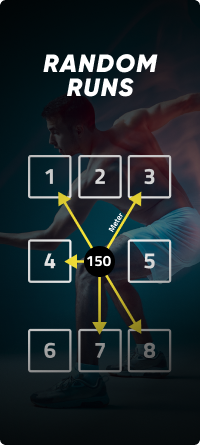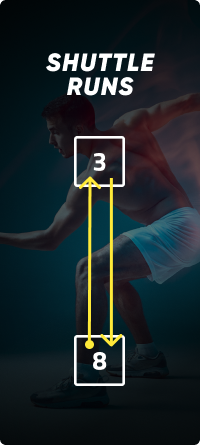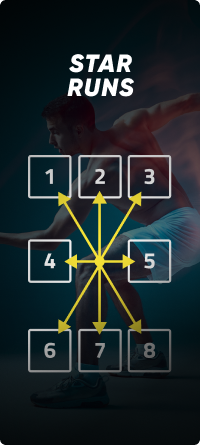Agility
Train your Agility
with SKILLCOURT
Imagine,
you can …
… move faster.
Your
benefits
as …
An Athlete
Faster acceleration and deceleration, along with quicker and more efficient directional changes, will result in faster actions, less injuries and improved outcomes.
A Patient
Economic movements and a physiological movement pattern reduce the risk of injury and quickly restore you to your former strength or even make you better.
A best Ager
Quick and safe movements, especially during direction changes or rapid actions, protect against falls, keep the heart and circulatory system fit, and ensure an independent life with joy.
A first Responder
Movement skill in protective gear, under pressure, and in extreme situations requires an extraordinary level of agility. Improving this ability can save lives – your own or others’.
What is Agility?
Definition
Agility refers to the ability to quickly perceive, process, and translate information from the environment (usually visual) into motor action. This capability includes both cognitive and sensory components and is also supported by muscle strength.
In sports, agility is crucial as it allows athletes to rapidly respond to in-game situations by changing their direction of movement in a very short time. In everyday life, good agility helps in executing movements precisely and safely, and in responding promptly to potential dangers.
This highlights that agility is important not just for sports performance, but also for general safety and effectiveness in daily life. It enhances the ability to react quickly and efficiently to changes in the environment, which can be beneficial in many different contexts.


Agility throughout life
Development
If agility is not trained, it tends to decrease with age. This decline is due to a reduction in visual and cognitive skills, as well as a loss of muscle strength and balance. As people age, their reactions become slower, and motor actions become more unstable. Consequently, the risk of accidents, particularly falls, increases with age.
Agility training can counteract this decline, helping to maintain health and independence into old age. Athletes also benefit from faster actions and reactions on the field, allowing them to be literally one step ahead of their opponents. This training is crucial not only for maintaining physical skills but also for reducing the risk of injuries and accidents in everyday life, thereby enhancing overall quality of life as one ages.
Agility is
trainable
At every level
To enhance agility, the SKILLCOURT offers a variety of general and sport-specific training exercises. Sport-specific agility exercises are designed to mimic situations and movement patterns found in different sports and can also be performed with a ball.
General agility training involves various forms of direction changes similar to those encountered in everyday life. Additionally, the SKILLCOURT differentiates between planned and reactive agility training. In planned agility exercises, the movement paths are predetermined, focusing primarily on the physical component of agility performance. Reactive agility training requires responding to an external stimulus, increasing the demand on sensory and cognitive abilities. This allows for the selection of training specifically tailored to the training goal. Various performance tests are available to regularly monitor training progress.
Agility
Exercises
For Kids, Patients and Athletes
On the SKILLCOURT, a special category has been developed for agility training. Various games enable both general and sport-specific training of planned or reactive agility. Additionally, some exercises can also be performed with a ball. The agility exercises on the SKILLCOURT include:
What people
say

Training on the SKILLCOURT has greatly enhanced my agility. The varied exercises have improved my coordination and nimbleness. I notice the difference not just in sports, but also in everyday life.
– Jennifer L.

As a dancer, agility is essential for me. The SKILLCOURT has taken my training to a new level. The dynamic exercises have greatly improved my coordination and speed.
– Linda K.

The SKILLCOURT is a game changer for my training. The exercises have significantly improved my agility, coordination, and reaction time. Especially the playful approach keeps me motivated time and again!
– David F.
Become a SKILLCOURT Partner
Are you interested in the SKILLCOURT and would like more information
on how you can integrate the training into your facility?
FA
Qs
What does agility mean?
Agility is the ability to perceive, process, and translate information into a targeted motor action in the shortest possible time. Both sensory (usually visual), cognitive, and physical (especially muscular strength) components contribute to agility performance.
How agility can be improved with SKILLCOURT?
The SKILLCOURT provides agility training tailored to every fitness goal. Whether planned or reactive agility, sports-specific or general, with or without a ball. SKILLCOURT training adapts to your needs to achieve optimal training results.
Which SKILLCOURT exercises are improving agility?
For sport-specific movements, SKILLCOURT includes a variety of agility drills. When it comes to changes of direction and reactive agility, the ‘Random Run’ and ‘Random Run Plus’ are suitable, placing higher demands on visual and cognitive functions.
– Figure Run
– Star Run
– Random Run
– Sport Drill
– Shuttle Run
What benefits does improving agility with SKILLCOURT bring to daily life?
In everyday life, traffic, and sports, we need to adapt our movements quickly to changes in the environment. The better our agility is trained, the more safely we act in daily life, the more independent we are as we age, and the better we perform in sports.
What factors influence agility throughout life?
Agility is influenced by perceptual and cognitive abilities as well as muscular strength. All these components decline with age, leading to a reduction in agility. With targeted training, SKILLCOURT can counteract this decline in performance.
Contact us
Are you interested in SKILLCOURT and would like more information on how to integrate the training into your facility? Then get in touch with us, and together we will develop a concept tailored to your needs!



